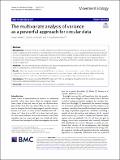The multivariate analysis of variance as a powerful approach for circular data
Date
27/04/2022Metadata
Show full item recordAbstract
Background A broad range of scientific studies involve taking measurements on a circular, rather than linear, scale (often variables related to times or orientations). For linear measures there is a well-established statistical toolkit based on linear modelling to explore the associations between this focal variable and potentially several explanatory factors and covariates. In contrast, statistical testing of circular data is much simpler, often involving either testing whether variation in the focal measurements departs from circular uniformity, or whether a single explanatory factor with two levels is supported. Methods We use simulations and example data sets to investigate the usefulness of a MANOVA approach for circular data in comparison to commonly used statistical tests. Results Here we demonstrate that a MANOVA approach based on the sines and cosines of the circular data is as powerful as the most-commonly used tests when testing deviation from a uniform distribution, while additionally offering extension to multi-factorial modelling that these conventional circular statistical tests do not. Conclusions The herein presented MANOVA approach offers a substantial broadening of the scientific questions that can be addressed statistically using circular data.
Citation
Landler , L , Ruxton , G D & Malkemper , E P 2022 , ' The multivariate analysis of variance as a powerful approach for circular data ' , Movement Ecology , vol. 10 , 21 . https://doi.org/10.1186/s40462-022-00323-8
Publication
Movement Ecology
Status
Peer reviewed
ISSN
2051-3933Type
Journal article
Description
LL is supported by the Austrian Science Fund (FWF, Grant Number: P32586). EPM receives funding from the European Research Council (ERC) under the European Union’s Horizon 2020 research and innovation program (Grant Agreement No. 948728).Collections
Items in the St Andrews Research Repository are protected by copyright, with all rights reserved, unless otherwise indicated.

